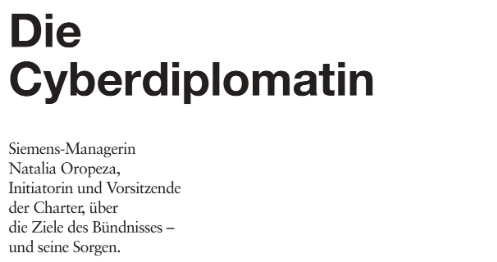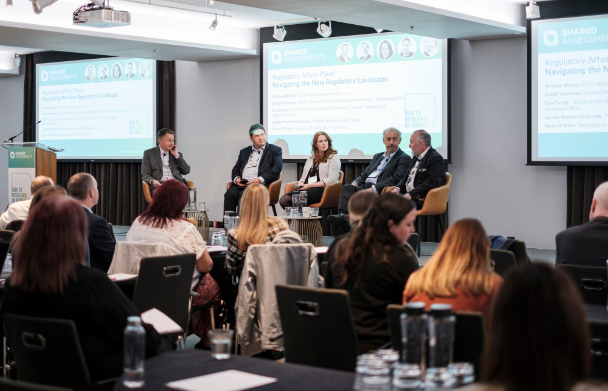Mitsubishi Heavy Industries (MHI) signed a letter of intent to join the Charter of Trust for cybersecurity in Tokyo today, expanding the Charter's reach into Asia. The company's membership is expected to be finalized by the end of September 2019. As the 17th Charter partner, MHI will be the first Asian company to join the global cybersecurity initiative.
“Cybersecurity is the key enabler for a successful implementation of the Internet of Things, as well as for protecting critical infrastructure,” said Joe Kaeser, President and CEO of Siemens. “And cybersecurity knows no boundaries. That’s why we highly appreciate Mitsubishi Heavy Industries joining us as the first big Asian company, making the digital world more trustworthy and secure. This will make our joint initiative even more global.”
“We are honored to be invited by Siemens and the other signatories to join the Charter of Trust for cybersecurity,” said Shunichi Miyanaga, President and CEO of Mitsubishi Heavy Industries. “Cybersecurity is a focal area for MHI, and we continue to place importance on developing next-generation solutions in this area. We hope to contribute to making this effort more global.”
The Charter of Trust was initially announced at the Munich Security Conference in 2018. Initiated by Siemens, it calls for binding rules and standards to build trust in cybersecurity and further advance digitalization. In addition to Siemens and the Munich Security Conference, the companies AES, Airbus, Allianz, Atos, Cisco, Daimler, Dell Technologies, Deutsche Telekom, Enel, IBM, NXP, SGS, Total and TÜV Süd signed the Charter. On February 15, 2019, the German Federal Office for Information Security (BSI), the CCN National Cryptologic Center of Spain and the Graz University of Technology in Austria joined as associate members. Charter of Trust member companies have also worked out baseline requirements to make digital supply chains more secure. The partners recently announced that they would be implementing these requirements in their own supply chains. These are important steps – especially in view of the increasing global risks.
According to the Center for Strategic and International Studies, threats to cybersecurity in 2018 caused €500 billion in losses worldwide. And threats to cybersecurity are constantly on the rise as the world digitalizes further: according to Gartner, 8.4 billion networked devices were in use in 2017 – 31 percent more than in 2016. This figure is expected to rise to 20.4 billion by 2020.


You may also like

Chairwoman Natalia Oropeza in Brandeins Magazine
In an interview with Dorit Kowitz, Natalia dives deep into the pressing issues facing the cybersecurity landscape, explaining how the Charter of Trust bundles the expertise of different businesses across several regions to stay resilient in the face of evolving threats. As Natalia Oropeza says: "We all win if cybercrime doesn’t win."
Here are three key insights from her interview:
🔑 Collaboration is essential: No single organization can tackle cyber threats alone. The Charter of Trust is a prime example that businesses nowadays are more transparent when it comes to attacks and that sharing information in this field can be beneficial.
🔑 Addressing the digital skills gap: The Charter of Trust is working to address the global shortage of cybersecurity professionals by encouraging diversity and actively promoting opportunities for women to join the field.
🔑 Unified regulations: Harmonizing global cybersecurity standards will reduce vulnerabilities, helping businesses and governments combat threats more effectively.
The full interview is available here: https://lnkd.in/gRm6ZDGC


Cybersecurity Awareness Month
The complexity and urgency of this topic gathered a lot of interest, with 600+ attendees throughout the whole panel, which was composed of Jon-Paul Jones, COO at AZ Commercial, Firas Ben Hassan, GenAI expert & Manager of AllianzGPT at AZ Technology, Dr. Martin J. Krämer, External Security Awareness Advocate at KnowBe4, and Dr Sumit Chanda, Global CISO at Eviden & Chair of the Global External Engagement Working Group at the Charter of Trust.
We are pleased to see Dr. Sumit Chanda from Eviden bringing in his unique CISO insight on what these emerging technologies mean in day-to-day cybersecurity practices and bringing in the Charter of Trust perspective on this topic as well.
Thank you, Ervin Cihan and Haydn Griffiths for inviting other CoT Partners and for the great initiatives that Allianz is putting together within this year’s Security Awareness Month. And special thanks to Heather Armond for the great moderation.


UK/EU Summit - “Risk to Resilience”
💡Under the theme “Risk to Resilience” the first event of this series was held in London and brought together professionals from different industries and regions. Detlef participated in the panel about the complex regulatory landscape and emphasized that new legislation like the EU AI Act, DORA and Hashtag#NIS2 continue to push the standard of care on cybersecurity and other risks.
Thanks to Shared Assessments for organizing such an amazing event and inviting the Charter of Trust to participate in this high-class panel alongside Andrew Moyad, CEO at Shared Assessments.



